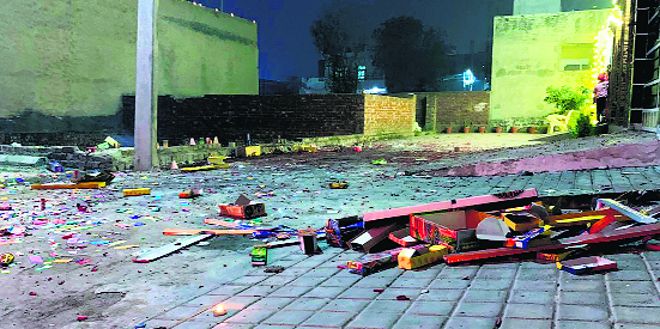
Tribune News Service
Amritsar, November 15
The air quality index (AQI) reached the alarming levels of 377 on the night of Diwali in the city, which was worse than that on last Diwali. The city was among those cities of the state where the worst AQI levels were recorded.
A good development was noted as the peak hour noise pollution levels due to bursting of crackers were reduced to two hours. The average air pollution remained 311.06 micro gross per meter (ug/m cubic) particulate matter (PM) 10 and 199.61 PM2.5.
Abhishek Kumar, engineer, Customer Support Department, said both PM10 and PM2.5 were found to be in severe category. Ideally, PM10 should be around 100 and PM2.5 at 60. However, both of them were found to be hovering around the severe level.
Cracker ban: five cases registered
- The state government’s orders regarding green Diwali and allowing use of firecrackers for two-hours (8 pm to 10 pm) went up in smoke as people kept bursting crackers till night. The police registered five cases against unknown persons for bursting crackers beyond 10 pm
- Charanjit Singh Gumtala, a social worker, said: “People are not accustomed to rules. It takes a considerable time for a rule to be understood and honoured.” He stressed to hold a campaign to illustrate demerits of crackers. He said educational institutes and public places should be utilised to send across the message
These particles cause health problems mostly in the upper respiratory tract as these consist of smoke, dirt and dust from factories, farming, roads and other sources.
The particles smaller than 2.5 micrometers are called PM2.5 as these carry toxic organic compounds and heavy metals. They are made from automobile exhaust, burning garbage and landfill, smelting and processing of metals.
Punjab Pollution Control Board (PPCB) SDO Sukhdev Singh said the AQI deteriorated during the months of October and November every year. “The winter season and delay in rain create lead to accumulation of dust particles and smoke in the immediate environment.”
The AQI had gone down to 65 during the lockdown while it was found at 90 in September when all industrial, farming, traffic and other activities had reached at full throttle after unlocking of the lockdown.
The data was recorded from residential, commercial, near sensitive installations like hospitals and educational institutes, besides industrial.
Meanwhile, the average noise pollution level was detected 70 Leq db (A). It was certainly high from the daily noise level. Vinod Kumar, JE, PPCB, said a positive thing found was that the peak noise pollution hours saw a decline this Diwali. It was found between 8 pm and 10 pm which used to be between 8 pm and 11.30 pm earlier.
He attributed it to many people avoiding bursting firecrackers. High inflation and awareness campaigns held by the government and NGOs had also led to a decline in the sale of firecrackers.
Join Whatsapp Channel of The Tribune for latest updates.



























